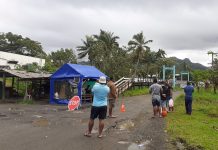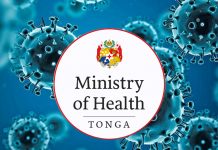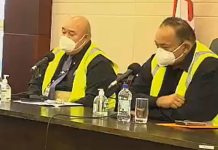This article is republished with permission under Kaniva News partnerships with Radio New Zealand.
Dr Ashley Bloomfield and Prime Minister Jacinda Ardern have confirmed a person has died with Covid-19 in New Zealand.
Watch here:
- If you have symptoms of the coronavirus, call the NZ Covid-19 Healthline on 0800 358 5453 (+64 9 358 5453 for international SIMs) or call your GP – don’t show up at a medical centre
Dr Bloomfield said New Zealand had its first death, after a woman who was initially diagnosed with influenza died.
The woman who died was in her 70s, from the West Coast. She died this morning.
“Understandably the family would like to take their time to grieve,” Dr Bloomfield said.
“This latest sad news reinforces our move to alert level four.”
He said 21 DHB staff who treated the woman when her diagnosis was thought to be influenza have been asked to self-isolate.
Dr Bloomfield said she was in hospital for two or three days before being tested for the virus. He said there was a link to overseas travel but that was still being investigated.
No other close contacts of the woman had been tested yet.
He said there were 63 new cases of the virus including 60 confirmed cases and three suspected cases. It brings the total to 514 cases in New Zealand.
“We are still seeing a strong link to overseas as well as travel.”
He said the contacts were still being followed up, but he felt certain the number of cases of community transmission would continue to rise, which was why the level-four alert was in place.
Prime Minister Jacinda Ardern said this would be an enormously difficult time for the family of the person who died.
She said she knew the thoughts of everyone from around the country would be with the family.
She said the death was an example of “exactly why” New Zealand had gone into lockdown to deal with the Covid-19 outbreak.
“It also brings home exactly why we are taking such strong measures to stop the spread of this virus,” she said.
“Our older New Zealanders and those with underlying health issues are by far the most at risk … our shield of protection for these people is physical distance.”
“Today’s death is a reminder of the fight that we have on our hands … stay at home, break the chain and save lives.”
She said more than 1800 tests were carried out in the past day, despite it being a weekend.
“I do worry that our older New Zealanders who may have a tendency to not wish to be perceived to be putting anyone out, may not be asking for the help that we need to give them.
“I want to again restate, you must stay home.”
She implored people – particularly parents and those who were elderly or with underlying health conditions – to stay home as much as possible.
“I have had a number of people say to me that they have not been able to convince their parents to listen to the advice.
“Anyone out there who’s over 70 or has underlying health conditions who is not listening to their children, please listen to me. You must stay at home. It’s devastating to lose anyone, it’s devastating to lose a parent, I don’t want that to happen to your children. Please stay at home.”
Ardern also warned against what she said amounted to bullying on social media.
She also said police had confirmed they had all the resources they needed including the ability to arrest if need be.
She said 840 people arrived from overseas yesterday, but the numbers of arrivals were falling significantly.
“We have to keep in mind though that returning New Zealanders through no fault of their own do carry the greatest risk.”
After reports about inflated supermarket prices, Ardern would not say whether the government planned to freeze supermarket prices but the government was looking at specific cases of prices for specific goods.
She said she would give a fuller update on a variety of concerns about supermarkets, including whether immune compromised workers or those aged over 70 were being asked to take annual or unpaid leave during the lockdown.
She also said the government was aware of the problem of people being able to source halal meat and was looking at solutions.
The government had also seen concerns about the shut-down of distribution of magazines and community newspapers, and said the government was trying to find a way to use existing distribution that could guarantee public health measures in the printing and distribution.
“The old forms of distribution … just would not work in the current environment.”
Dr Bloomfield said the Ministry had been able to collate some statistics which showed Māori were about 4 percent of New Zealand cases, and Pacific Islanders 2.3 percent.
The total number of cases in New Zealand yesterday was 451, up by 83 from the day before.
There are expected to be no further official updates today.







